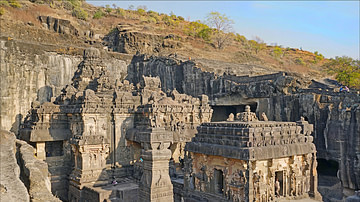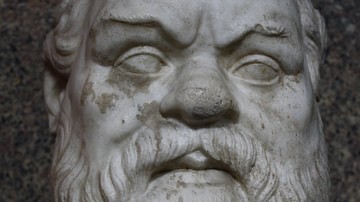Search
Search Results

Definition
Charvaka
Charvaka (also given as Carvaka) was a philosophical school of thought, developed in India c. 600 BCE, stressing materialism as the means by which one understands and lives in the world. Materialism holds that perceivable matter is all that...

Video
The Philosophy of Stoicism - Massimo Pigliucci
View full lesson: http://ed.ted.com/lessons/the-philosophy-of-stoicism-massimo-pigliucci What is the best life we can live? How can we cope with whatever the universe throws at us and keep thriving nonetheless? The ancient Greco-Roman...

Article
Marcus Aurelius: Philosopher Emperor or Philosopher-King?
Co-authored by Steven Umbrello and Tina Forsee It is very common to hear in both academic circles, as well as more close-knit Stoic circles, Marcus Aurelius (121 – 180 CE) being referred to as the philosopher king. This is not an idea...

Article
Ellora Caves
Ellora (also known as Elura and, in ancient times, as Elapura) is a sacred site in Maharastra, central India. The Ellora Caves are listed by UNESCO as a World Heritage Site and is celebrated for its Hindu, Buddhist, and Jain temples and monuments...

Interview
Interview: Bejeweled Sri Lanka
The first comprehensive survey of Sri Lankan art organized by an American museum, The Jeweled Isle: Art from Sri Lanka, on show now at the LACMA in Los Angeles, California, presents some 250 works addressing nearly two millennia of Sri Lankan...

Video
The Philosophy Of Sir Francis Bacon
In the 17th century Sir Francis Bacon stood at the very foundation of the scientific revolution and would introduce to it the scientific method that we have amended for our use in modern times. Many of his years were spent as a politician...

Definition
Gupta Architecture
The Gupta Dynasty (4th-6th century) in North Central India saw the first purpose-built Hindu (and also Buddhist) temples which evolved from the earlier tradition of rock-cut shrines. Adorned with towers and elaborate carvings, these temples...

Definition
Borobudur
The Temple of Borobudur or sometimes "Barabudur" is a Mahayana Buddhist temple located close to Muntilan on the island of Java in Indonesia. Built during the rule of the Sailendra Dynasty (c. 650-1025 CE), Borobudur remains the world's largest...

Definition
Socrates
Socrates of Athens (l. c. 470/469-399 BCE) is among the most famous figures in world history for his contributions to the development of ancient Greek philosophy which provided the foundation for all of Western Philosophy. He is, in fact...

Definition
Crates of Thebes
Crates of Thebes (l. c. 360-280 BCE) was one of the most important Cynic philosophers of ancient Greece. He was born to a wealthy family in Thebes but gave away his inheritance after realizing the futility of material possessions. He then...